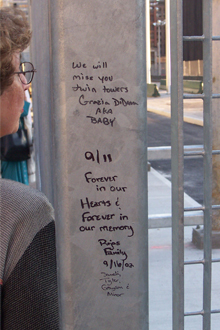Urban anthropologist to speak on future of Ground Zero
Visiting Harvard anthropologist focuses on how cities rebuild after disaster

First envisioned as memorial site for those who lost their lives during the attacks of Sept. 11, Ground Zero has become a blueprint of contentious debate, an emotional battleground where groups from opposing views continue to spar for what they feel should become of the sacred square.
Elizabeth Greenspan, an urban anthropologist and lecturer at Harvard University, will come to Brandeis this week to discuss the research she began days after the twin towers fell. Her lecture, "Clashing Voices: The Battle Over Language at Ground Zero," will take place on Thursday, April 28, at 3:30 p.m. in Mandel G4. It is part of the Anthropology Colloquium Series.
Greenspan says that battles to define the World Trade Center site's future have often doubled as contests over language and speech – contests to control who may, and may not speak, and which narratives may, and may not, be told.
She began documenting both the physical and emotional aftereffects of 9/11 soon after the towers fell. Then a graduate student living in Philadelphia, her interests centered on how people rebuilt cities following war and violence.
"After 9/11, politicians, pundits, journalists, so many people started talking about what to rebuild," says Greenspan. "I thought this rebuilding process would reveal a great deal about how Americans were responding to 9/11 and making sense of what this event meant. I thought it would be an important place, and an important process."
 Among subject matters summoning up controversy currently is the installation of The Cross at Ground Zero.
Among subject matters summoning up controversy currently is the installation of The Cross at Ground Zero.
This cross, the tallest of numerous crosses by steel beams that stuck upright in the rubble when the trade center collapsed, became a symbol of survival for the many workers during the rescue efforts. The controversy centers on the propriety of having this single religious symbol represent the tragedy of the nation.
A letter to the editor published in the New York Times expressed mixed feelings about erecting a religious symbol. Steven Berkowitz wrote:
"...To have the symbol of one religion elevated altar-like over the site implies that this tragedy belongs more to one religion than to others. And that's a profoundly divisive message."
Some of the topics that will be discussed during Greenspan's lecture include Feisal Abdul Rauf, the imam who is behind building a Muslim mosque and community center two blocks from ground zero; panegyric graffiti from visitors around the world; and the barring of the International Freedom Center, a museum that had planned to preserve historical international struggles for freedom, which drew opposition from families.
Debra Burlingame, the sister of Charles F. Burlingame III, the pilot of American Airlines Flight 77 whose plane crashed into the Pentagon, wrote an op-ed in The Wall Street Journal condemning a museum dedicated to historical events other than 9/11.
"The International Freedom Center was an obstacle not simply for the families, the first responders and all those who were personally affected by the events of Sept. 11," Burlingame said in a telephone interview with the New York Times, "but for all Americans who will be coming to the World Trade Center memorial to hear the story of 9/11 and that story only..."
For the first year following 9/11, and to some degree a bit beyond that, Greenspan says that people from across the nation and world visited the World Trade Center site. They brought homemade shrines and wrote on the temporary walls and signs that surrounded the area signing their names and hometowns.
"They left messages and engaged in conversations with others on the boards," says Greenspan. "It was like an on-line comments board, except that it was real."
--------------------------
Greenspan has a Ph.D. in cultural anthropology and a graduate certificate in urban studies from the University of Pennsylvania. She worked as a reporter at the Arizona Republic and the Associated Press and has written for The Atlantic.
Categories: Humanities and Social Sciences






